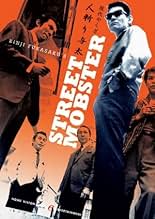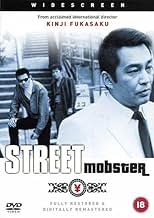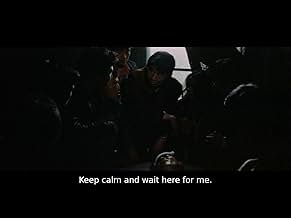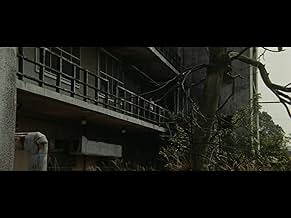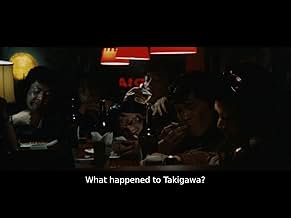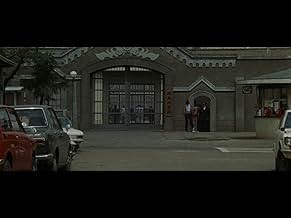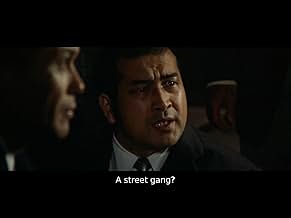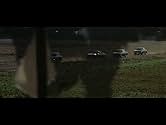CALIFICACIÓN DE IMDb
7.1/10
1.3 k
TU CALIFICACIÓN
Agrega una trama en tu idiomaA yakuza, who has an untamed rage and lack of respect for authority, finds himself leading the remnants of the gang he once belonged to in order to secure an area of their own.A yakuza, who has an untamed rage and lack of respect for authority, finds himself leading the remnants of the gang he once belonged to in order to secure an area of their own.A yakuza, who has an untamed rage and lack of respect for authority, finds himself leading the remnants of the gang he once belonged to in order to secure an area of their own.
- Dirección
- Guionistas
- Elenco
- Dirección
- Guionistas
- Todo el elenco y el equipo
- Producción, taquilla y más en IMDbPro
Opiniones destacadas
Street Mobster is among my favorite yakuza films, and from one of my favorite Japanese directors. This is a great, less-popular Fukasaku film, and it really deserves more attention.
Okita is our "hero", if you can call him that. He's hot-heated, violent, and unapologetic. I can't think of a time in the film where he really shows restraint. He's just such an over-the-top, punk rockin' character who doesn't care about rival gangs or other thugs; he wants to do what he wants, when he wants to. And that's definitely the driving force behind the film, it's explosive nature. It's so unglamorous and filthy at times, and yet you have this sense of a man living his life, maybe not to it's full potential, but having a hell of a lot of fun doing what he's doing. And maybe he's not even enjoying it, everything else is just too conformist for him. He simply doesn't back down. So he really is a hero, a hero to the downtrodden. A counterculture icon, a raging machine.
With it's boisterous protagonist comes a slew of background characters who are really just there to make Okita the centerpiece. Aside from the prostitute that he raped years earlier and now forms a bond with (Whose name I can't even remember!) there are few other noteworthy characters. And that's really okay. When they speak, they speak to get Okita's reaction. If you don't like Okita, then you're probably not going to like the film. Me, I enjoyed this rebellious, non-conformist gangster, yelling and picking fights. It was just so over-the-top and the director clearly embraced the punk style that was emerging at the time of this film's release.
Speaking of release time, I just watched the film again a few minutes ago, and I still can't believe it was made in 1972. I'm sure you've heard it before, but it's way ahead of it's time. It looks 90s-ish to me. The shaky-cam and jump cuts stand out most as then-foreign techniques. Of course, now they've become the norm in films.
So that's my short review. I don't feel that there's a whole lot more ground to cover as Okita is really the main attraction. So if you're looking to kill 87 minutes and consider yourself a fan of exciting cinema, look no further than Street Mobster.
Okita is our "hero", if you can call him that. He's hot-heated, violent, and unapologetic. I can't think of a time in the film where he really shows restraint. He's just such an over-the-top, punk rockin' character who doesn't care about rival gangs or other thugs; he wants to do what he wants, when he wants to. And that's definitely the driving force behind the film, it's explosive nature. It's so unglamorous and filthy at times, and yet you have this sense of a man living his life, maybe not to it's full potential, but having a hell of a lot of fun doing what he's doing. And maybe he's not even enjoying it, everything else is just too conformist for him. He simply doesn't back down. So he really is a hero, a hero to the downtrodden. A counterculture icon, a raging machine.
With it's boisterous protagonist comes a slew of background characters who are really just there to make Okita the centerpiece. Aside from the prostitute that he raped years earlier and now forms a bond with (Whose name I can't even remember!) there are few other noteworthy characters. And that's really okay. When they speak, they speak to get Okita's reaction. If you don't like Okita, then you're probably not going to like the film. Me, I enjoyed this rebellious, non-conformist gangster, yelling and picking fights. It was just so over-the-top and the director clearly embraced the punk style that was emerging at the time of this film's release.
Speaking of release time, I just watched the film again a few minutes ago, and I still can't believe it was made in 1972. I'm sure you've heard it before, but it's way ahead of it's time. It looks 90s-ish to me. The shaky-cam and jump cuts stand out most as then-foreign techniques. Of course, now they've become the norm in films.
So that's my short review. I don't feel that there's a whole lot more ground to cover as Okita is really the main attraction. So if you're looking to kill 87 minutes and consider yourself a fan of exciting cinema, look no further than Street Mobster.
Bunta Sugawara plays a low-level criminal who keeps getting in trouble with a major yakuza clan. After a ton of screwing around with them, a second yakuza clan adopts him as one of their own. At first, everyone's happy about it, but soon enough, Sugawara feels trapped and starts to act out. This, of course, does not please his bosses. The main problem with this one is that Sugawara's character is just so unlikable - you have to wonder why the yakuza on either side keep letting him screw around so much. The mobsters from The Godfather would have whacked him instantly (especially since he's essentially a nobody; he has a few followers, but they're just punks, too). The value of the film comes from Fukasaku's direction, which seems revolutionary for 1972, almost Jason Bourne-like with hand-held cameras, thrusting the audience in the kinetic action sequences. The direction is definitely some of Fukasaku's best work.
Outlaw Killer or as it says in the film, Street Mobster, is a bloody violent look into a totally self-destructive renegade street punk that can't ever seem to back down from a fight, no matter how suicidal. Truly a hilarious, incredibly charismatic character. So funny.
The film follows him as he talks about his youth, his incarceraton and picks up with him creating a new gang. Parts are a bit too melodramatic, especially at the end, but the characters are well-crafted and the action sequences are frenetic and fun.
A unique view of yakuza and street punk life in Japan in the early '70s from crazy-guy Fukasaku, the man behind Tora! Tora! Tora! and the fantastic Battle Royale.
The film follows him as he talks about his youth, his incarceraton and picks up with him creating a new gang. Parts are a bit too melodramatic, especially at the end, but the characters are well-crafted and the action sequences are frenetic and fun.
A unique view of yakuza and street punk life in Japan in the early '70s from crazy-guy Fukasaku, the man behind Tora! Tora! Tora! and the fantastic Battle Royale.
"Street Mobster" is part of the early 70's crop of Japanese yakuza films that were spearheaded by Kinji Fukasaku, who is once again behind the helm without missing a beat. All the mandatory elements that make a yakuza film work are present: forming and switching of alliances between yakuza families, fistfights, stabbings, a guerilla view of Tokyo, frenetic action sequences, sleaze. But whereas a lesser, more workmanlike director would work these things from a checklist, Fukasaku instills so much energy that even the most rudimentary of things are a pleasure to watch.
Indeed "Street Mobster" is packed full of raw, animalistic energy that more than makes up for the fairly predictable nature of the story. In typical yakuza fashion, yakuza gets out of prison after doing time for a hit, forms a small gang, takes on the bigger families, carnage ensues. It's all part of what makes the genre such pure, unadulterated fun though. However all these typical genre staples take a wildly exhilarating life of their own through Fukasaku's hyperkinetic and gritty style. There's no glamour or glory to be found in Fukasaku's violence: only brutality. Stylization is kept to a bare minimum with lots of hand-held shots and cameras constantly on the move that blend in with the action. The same guerilla tactics are used for the exterior shots that capture the seedy, downtrodden side of a Tokyo full of possibilities. Dilapidated warehouses, cheap bath houses, dark rooms, dim-lit diners, rundown neighborhoods with wooden cabins, again there's no glitz or neon lights shining in Fukasaku's yakuza universe.
Regular collaborator Bunta Sugawara takes on the role of the titular Street Mobster, but gone is his cool (and sullen) demeanor from other yakuza films. He's responsible for some serious scenery consumption, wildly overacting, often approaching even Kikuchiyo territory (Mifune's character from Seven Samurai) but with the same honest, natural approach that made him the great actor that he was. He's also one of the best physical actors I've seen and you can see it paying off in dividends with every fight scene he gets involved with (and there are lots, don't worry).
If you'd like to see a different kind of gangster film, one that relies more on viscera, grittiness and raw energy than faux glamour and hip mafiosos, you should definitely invest in Street Mobster. It's pulpy, fast-paced and balls-out. 70's Japanese action cinema in top form
Indeed "Street Mobster" is packed full of raw, animalistic energy that more than makes up for the fairly predictable nature of the story. In typical yakuza fashion, yakuza gets out of prison after doing time for a hit, forms a small gang, takes on the bigger families, carnage ensues. It's all part of what makes the genre such pure, unadulterated fun though. However all these typical genre staples take a wildly exhilarating life of their own through Fukasaku's hyperkinetic and gritty style. There's no glamour or glory to be found in Fukasaku's violence: only brutality. Stylization is kept to a bare minimum with lots of hand-held shots and cameras constantly on the move that blend in with the action. The same guerilla tactics are used for the exterior shots that capture the seedy, downtrodden side of a Tokyo full of possibilities. Dilapidated warehouses, cheap bath houses, dark rooms, dim-lit diners, rundown neighborhoods with wooden cabins, again there's no glitz or neon lights shining in Fukasaku's yakuza universe.
Regular collaborator Bunta Sugawara takes on the role of the titular Street Mobster, but gone is his cool (and sullen) demeanor from other yakuza films. He's responsible for some serious scenery consumption, wildly overacting, often approaching even Kikuchiyo territory (Mifune's character from Seven Samurai) but with the same honest, natural approach that made him the great actor that he was. He's also one of the best physical actors I've seen and you can see it paying off in dividends with every fight scene he gets involved with (and there are lots, don't worry).
If you'd like to see a different kind of gangster film, one that relies more on viscera, grittiness and raw energy than faux glamour and hip mafiosos, you should definitely invest in Street Mobster. It's pulpy, fast-paced and balls-out. 70's Japanese action cinema in top form
This movie is the life story of a punk named Isamu--with the bulk of it following his insane path following his release from prison. While the idea of a mobster being a sociopath is no surprise, Isamu is peculiar even among the yakuza. This is because he also has an insane need for excitement and is incredibly self-destructive and angry--so much so that you know he cannot continue his path for long. After all, taking on the yakuza (sort of like the Japanese mafia) nearly single-handedly is just plain nuts! Yet, this crazed punk assembles a very small gang and attempts to do just that!
"Street Mobster" is one of the most violent and nihilistic Japanese films I have ever seen. Its violence is vicious, uncaring and filled with pure rage. And, as a portrait of a thug, it IS effective and realistic. But, with graphic rapes, stabbing after stabbing after stabbing, it makes you wonder who the audience would be for this blood-fest. Plus, after raping one woman, the lady then has a twisted love-hate relationship with him that is just plain unsavory. Not a movie I enjoyed and one I am loathe to recommend because it's so nasty, but it IS unflinching and pulls no punches.
"Street Mobster" is one of the most violent and nihilistic Japanese films I have ever seen. Its violence is vicious, uncaring and filled with pure rage. And, as a portrait of a thug, it IS effective and realistic. But, with graphic rapes, stabbing after stabbing after stabbing, it makes you wonder who the audience would be for this blood-fest. Plus, after raping one woman, the lady then has a twisted love-hate relationship with him that is just plain unsavory. Not a movie I enjoyed and one I am loathe to recommend because it's so nasty, but it IS unflinching and pulls no punches.
¿Sabías que…?
- ConexionesFeatured in Yakuza Eiga, une histoire du cinéma yakuza (2009)
Selecciones populares
Inicia sesión para calificar y agrega a la lista de videos para obtener recomendaciones personalizadas
Detalles
- Fecha de lanzamiento
- País de origen
- Sitio oficial
- Idioma
- También se conoce como
- Street Mobster
- Productora
- Ver más créditos de la compañía en IMDbPro
Contribuir a esta página
Sugiere una edición o agrega el contenido que falta

